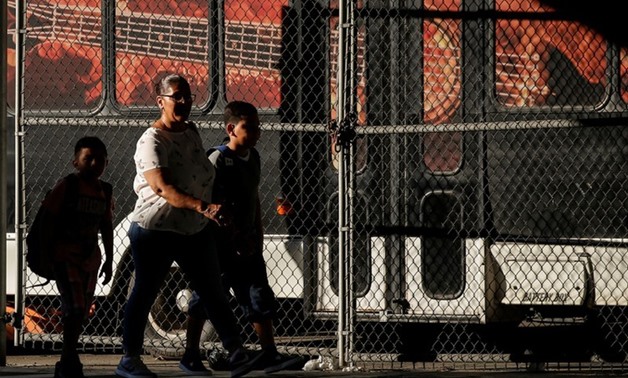
Children are escorted to the Cayuga Center, which provides foster care and other services to immigrant children separated from their familie - Reuters
14 July 2018: A U.S. judge ordered the government on Friday to pay the costs of reuniting immigrant parents with their children after they were separated by officials at the U.S.-Mexican border.
The U.S. government is working to reunite around 2,000 children with their parents, who were detained and separated as part of U.S. President Donald Trump's "zero tolerance" policy to deter what he has said is illegal immigration.
"It doesn't make any sense for any of the parents who have been separated to pay for anything," said U.S. Judge Dana Sabraw at a hearing in San Diego.
Sabraw in June ordered the children reunited by July 26, and the government missed a deadline this week for getting the youngest children back with their parents.
The case stems from a lawsuit brought by the American Civil Liberties Union (ACLU). Their lawyer said at Friday's hearing immigrant parents had been told by immigration officials they had to pay for their travel.
One parent was initially asked to pay $1,900 to be reunited with their child, according to court papers from the ACLU.
Sarah Fabian, a lawyer for the government, said those decisions were handled at the field level and said the U.S. Department of Health and Human Services, which houses detained children, had limited resources. She called the judge's order "a huge ask on HHS."
"The government will make it happen," Sabraw responded.
The judge also agreed to impose timelines on the government for reporting details about its reunification efforts.
The government has said its initial reunifications were slowed by the need for DNA testing and criminal background checks on parents, and to determine their fitness to care for their children.
At Friday's hearing, the government said it was working on a modified reunification plan that would streamline the process and would require fewer DNA tests.
The judge also seemed inclined to grant an ACLU request to require advance notice to advocates for the parents, which would give the advocates details on the timing and location of the reunification.
The ACLU said it did not receive any advance notice this week of reunifications for the youngest children, which the group said could undermine the safety of the reunited family.
The group cited in court papers a mother who was reunited with her 6-month-old daughter, and then they were dropped alone at a bus stop late at night. The woman finally obtained a bus ticket around midnight Tuesday after her attorney and an advocate got involved, the ACLU said.
As of the hearing, the government had not provided a list of the number of children in its custody that it believes are eligible for reunification. Fabian said the government expected to give that to the ACLU as soon as Friday.
The Trump administration adopted its family separation policy as part of an effort to discourage illegal immigration. It buckled to intense political pressure and abandoned the policy on June 20.

Comments
Leave a Comment